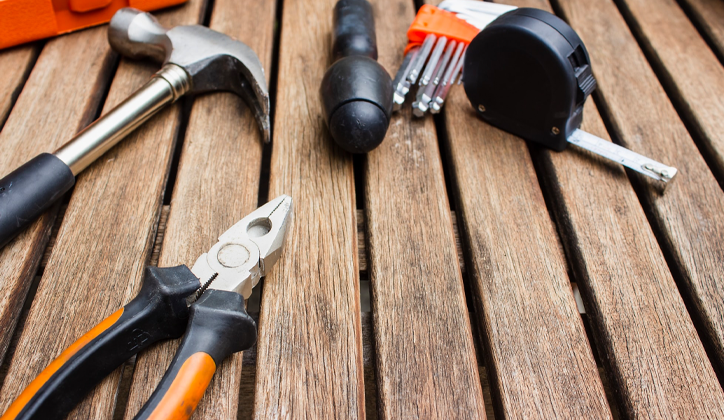I am fascinated by the physical tools of trade: a carpenter’s saw, a writer’s pen, a magician’s cards. When I started my working life as an electrician, the tool most often in my hands was a pair of wire stripper pliers. When I left that job to work in resource conservation, my most important tool was my 1,000-milliliter graduated cylinder for field work (it also helped swat away spiders, which are numerous in the Everglades area). Now that I’ve left that career to follow my calling into ministry, I find myself again considering the idea of physical tools.
If I told you that a pastor’s most important physical tool is a Bible, you’d probably say, “no duh, Mark. We know that the Word is the sword of the Spirit (Ephesians 6:17).” But, I propose that the best tool is not just any Bible, but a good study Bible.
A Power Tool
The Bible, of course, is not just a great book or handy manual; it is the very Word of God to the people He loves.
For the word of God is living and active, sharper than any two-edged sword, piercing to the division of soul and of spirit, of joints and of marrow, and discerning the thoughts and intentions of the heart. – Hebrews 4:12 (ESV)
There is a power in this book unlike the tool of any other profession. Of course, that power is not just for pastors, but pastors are specifically called to lead God’s people into deeper understanding of what God says about who He is, who we are, and His purpose for creation.
Worth the Weight
If the Bible itself is the Word of God, why assert that the most important tool for the pastor is a study Bible? Aren’t they cumbersome and unwieldy? Yes, they are. But there’s a reason and value in that extra weight.
We live in a golden age of quality theology tools. Technology has led to advances in translation, archeology, communication between Bible scholars, and access to past works. We have excellent information and methods at our disposal for helping understand and apply God’s Word. Good study Bibles draw from many different resources to help give context to the great story of the Gospel.
A study Bible has more than just helpful notes at the bottom of the page to clarify confusing passages (though these are often illuminating). There is much to be gained from utilizing other features:
- Book introductions to contextualize the larger story
- Articles that help us understand how God delivered His Word to us
- Maps that give a geographic picture of where the stories unfolded
- Illustrations that help with a visual understanding of events
- Charts and graphs that provide perspective on people and places
- Cross-references that show how the Bible is one great Word
- Indexes and concordances that help in finding passages
Each of these is a resource in and of itself that makes it easier to interpret and apply this holy Word to our hearts, relationships, and cultures. While I love my slimline Bible and keep it handy when I travel, most of the time I think it’s worth the extra effort to carry this powerful tool instead.
Some Tips for Consideration
- Just because it’s a study Bible, it doesn’t need to be enormous. I use a “personal size” study Bible in the ESV, and there are others that are somewhat smaller than a college dictionary. Try to find one you’ll actually carry, or even invest in a few different ones for different places (home, office, travel).
- Use the version you and your flock are most comfortable with – one that’s fairly literal (probably not The Message) for everyday reading.
- Invest in a real leather cover. They cost more upfront, but they last considerably longer (apologies to PETA).
- Use a pen or highlighter to mark up your Bible. This is not a dead word, but living and active and meant for engagement. Underline, circle, and make notes in the margins. This is not an heirloom; it is the tool of your trade. It should not be museum-quality after a month of use.
- Keep ever present in your mind that only the words above the line on the page are God breathed.
Tools are Meant to Be Used
My wire stripper pliers were greasy and dirty after a few weeks’ work. My graduated cylinder was soon scratched and splattered with spider guts. Tools are meant to be taken out and used. I believe the most important physical object for the work of ministry is the Word of God. Keep it near always and dive into this treasure for yourself and others. Wielded well, it will do work well beyond the meager gifts we tradesmen bring.

